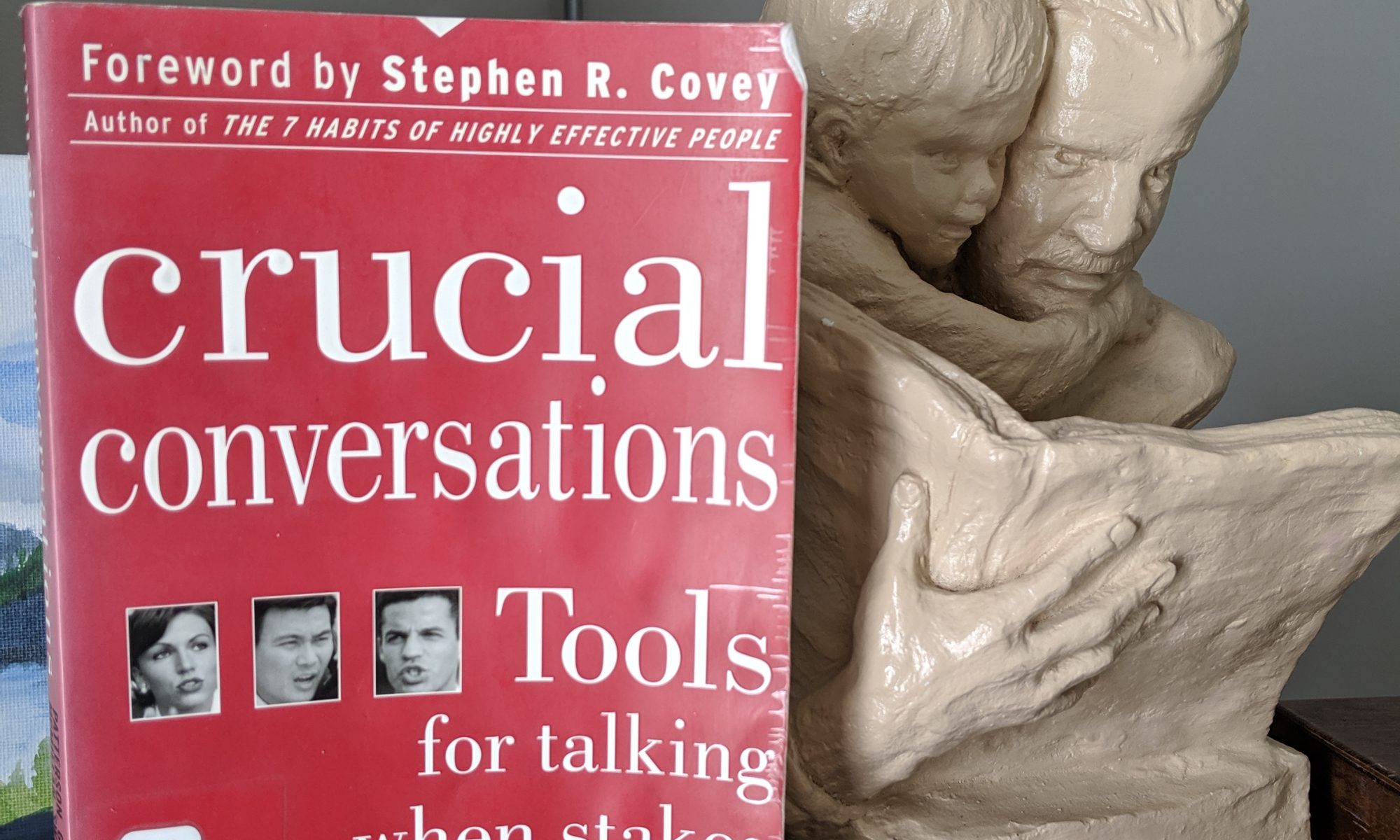Crucial Conversations

Crucial Conversations is a child of The 7 Habits of Highly Effective People: Powerful Lessons in Personal Change. Crucial Conversations does a deep dive into applying the 7 habits into our dialogue.
Crucial Conversations' main premise/question, "What do I really want out of this conversation?", is intuitive yet powerful. People rarely exert the will or know-how to slow down enough to consider that question when they try to dialogue. So our conversations end up careening out of control and we all walk away worse off.
And if we will believe it, it is actually our fault we lose control! We sabotage our desires by not slowing down long enough to engage other people thoughtfully.
It is true, we do not control the people we engage with. So when they don't act or speak like we desire we are tempted to believe we have no options. "This person's behavior is keeping me from what I want and I have no control....I'm a victim." Does that mean we have no options? Or are there ways we can speak and behave that empower us to get what we want out of even very difficult situations? Crucial Conversations' theory is that we do have power.
The question above ("what do I really want?") is the one I will keep in the front of mind after this read, but the book actually has numerous tools to help deploy in our conversations and attempts at dialogue. Most of these tools have acronyms (ABC, STATE, CRIB), and the authors have helped by turning the tools into a Crucial Conversations Model that would be easier to commit to memory than words. However, the only way these tools become powerful is if one practices them. Over and over and over.
The most effective practice would be role playing. However, role-playing makes most so uncomfortable, they won't try it. However, if you find that you have multiple relationships that cause you stress instead of adding joy to your life, isn't the practice and the role-playing worth a shot? Is there any chance you see no positive difference in those relationships?
So Many Applications
It was difficult for me to keep my brain focused on particular applications of the book's tools. My mind kept hopping from applications in my family, to my church family, to my role as President of the Chamber of Commerce, to my client interactions, to Young Life leaders, to Young Life students, to my community, to my friendships.
If I had more time, I would reread the book at least a few times with the goal of focusing on one particular area of application each time. I'd start with my family, because they are the closest to me physically and emotionally. Then I would read the book again thinking about client interactions. My hope is that I can broadly and effectively apply the tools to those areas after reading the book only once. We'll see how it goes!
Should you read?
This book has principles that can be applied to everyone and every organization and so I would recommend it to all. I would love to see a kids version of Crucial Conversations meant for kids between 6 and 12 years old. But parents modeling will be the best teaching tool our kids can have to help them learn effectiveness in their conversations and relationships.
As a leader in a few organizations (Young Life, Church, Chamber of Commerce) I will
strongly encourage others in those organizations to read or listen to this book as well. The toughest challenge to apply these principles will be truly dying to our own desires and genuinely wanting to see others' desires gratified. Most are simply unwilling to want that and it will take a change of heart to get there. But what if this book is the beginning of changing our heart? Seeing that our hearts are actually the problem instead of others?
In my experience, I have often been my own worst enemy keeping me from the fullest and most gratified life I was created for. Everyday I come to believe that a bit more, and these types of books certainly speed that process.
If you're ready for that type of journey, then move Crucial Conversations towards the top of your reading list.